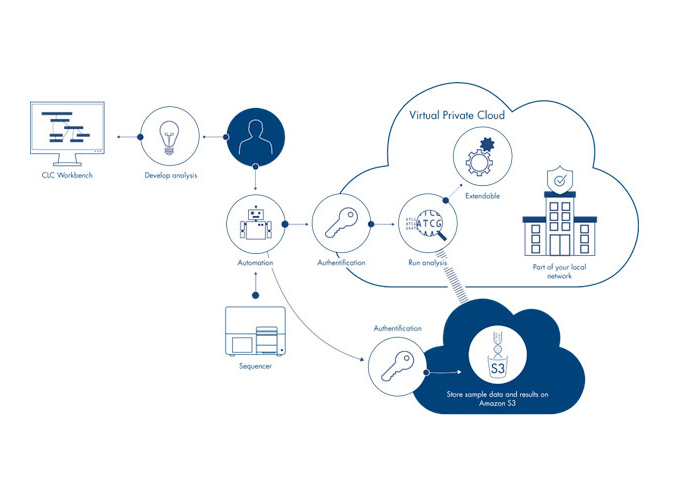
Cloud computing bioinformatics for every biologist
QIAGEN CLC Genomics Cloud Engine turns biologists into bioinformatics experts by seamlessly integrating the power of Amazon Web Services (AWS) cloud computing with QIAGEN CLC Genomic Workbench and QIAGEN CLC Genomics Server.
Bring the analysis to your data by building QIAGEN CLC workflows locally and deploying them on AWS in minutes. Directly from QIAGEN CLC Genomics Workbench, you can browse your data on Amazon S3, build workflows and deploy them on AWS to run via the QIAGEN CLC Genomics Cloud Engine. Workflows can also be run from the command-line or a local on-premise QIAGEN CLC Genomics Server. Once workflows are completed, results are stored on Amazon S3 to be downloaded later, or automatically downloaded in the background while you continue your work. Order now.
Home > Bioinformatics Products Overview > Bioinformatics Tools and Applications > Enterprise NGS Solutions > QIAGEN CLC Genomics Cloud Engine
Built on a highly secure and reliable infrastructure
QIAGEN CLC Genomics Cloud Engine runs on Amazon Web Services, the world’s largest and most stable cloud infrastructure, to drive your cloud computing bioinformatics. QIAGEN’s software leverages AWS to the maximum extent to provide a stable, secure service that ensures that your data is encrypted in transit as well as at rest. All access to the system requires authentication and is implemented with single-sign-on to make the security measures strong but unobtrusive. You own your data and where it’s stored.
Built for unlimited bioinformatics
QIAGEN CLC Genomics Cloud Engine is designed to make cloud computing bioinformatics analysis scalable and accessible to anyone involved in analysis of next-generation sequencing (NGS) data. NGS analysis in the cloud is now possible for your business. It brings the full range of QIAGEN CLC tools and enables users to analyze NGS data wherever they are located, at the speed of which the data is generated and at a competitive total cost of ownership
Virtual private cloud
QIAGEN CLC Genomics Cloud Engine runs as a private software, as a service solution on your own Amazon virtual private cloud. You control access and the limits to how much of Amazon’s nearly unlimited computational resources are leveraged for your data. In addition, when you subscribe to QIAGEN CLC Genomics Cloud Engine, you will receive a personalized on-boarding by our professional Field Application Scientists, who will make sure you get maximum use QIAGEN CLC Genomics Cloud Engine on Amazon’s cloud computing infrastructure without breaking your budget.

A cloud computing bioinformatics solution tailored to your needs
Not ready for a full QIAGEN CLC Genomics Cloud Engine deployment? Ask about our limited Staging Environment distribution. The QIAGEN CLC Genomics Cloud Engine Staging-License is restricted to running on only three AWS instances at once, but at a substantially reduced price. If you need a smaller environment for development, or want to test the waters of AWS before deploying at a larger scale, this version is perfect for you.
Need to integrate with an existing IT infrastructure? No problem. The QIAGEN CLC Genomics Cloud Engine has a full RESTful API that enables enterprise customers to fully integrate their cloud computing needs into their existing IT architecture. Furthermore, the QIAGEN CLC Genomics Cloud Engine Command Line Tools provide a second means to use QIAGEN CLC Genomics Cloud Engine for advanced bioinformatics users.
Should you need a unique or custom configuration, your IT administrators will enjoy our detailed documentation to help set that up. Alternatively QIAGEN Digital Insights Custom Solutions team can assist in tailoring QIAGEN CLC Genomics Cloud Engine for any bioinformatics job.
The QIAGEN CLC Cloud Engine launches your enterprise bioinformatics platforms into the cloud thanks to near-automatic rapid deployment. Within a week, you can have a completely deployed cloud environment fully capable of running analyses securely.
• Uses AWS cloud computing bioinformatics technology and runs in a secure, customer-owned VPC environment
• Uses virtual private cloud (VPC) infrastructure to make the cloud a part of your on-site network
• Scales to any storage size on demand; use S3 storage and only pay for storage that is actually in use
• Scales to fit changes in sample production rate and analysis processing time within limits defined by you (using Amazon Auto Scaling)
• Job scheduling can be carried out, completely securely, from the internet
• Comes with an easy-to-use command line interface to run QIAGEN CLC workflows
• Allows the use of QIAGEN CLC Genomics Workbench software for result visualization and interpretation, and for easy workflow design and validation
Customer requirements
• Existing account with Amazon Web Services
• An OAuth2 compliant authorization server capable of providing access and refresh tokens for user authentication; QIAGEN CLC Genomics Cloud Engine (GCE) is also fully compatible with AWS Cognito, Amazon’s authentication service
• One or more Amazon S3 storage location(s) that the system can use for storing input and output data.
• While running QIAGEN GCE, customer must maintain an AWS instance running as the QIAGEN GCE Job Manager
• A valid subscription license for QIAGEN GCE provided by QIAGEN
• User access, authentication, and storage management is the responsibility of the customer
• Customer is responsible for all usage fees and other costs associated with using Amazon Web Services to run QIAGEN CLC Genomics Cloud Engine
Key Features
• Large suite of best-in-class bioinformatics tools (algorithms, analyses)
• CLC Workflows for simplifying and streamlining genomic data analysis
• Secure encrypted data at rest and encrypted data in transit from client to end-point
• Fault-tolerant: no single point of failure
• Private cloud using AWS VPC with no access outside the company network
• Scalable: unlimited data storage space and processing power (on demand)
• Cost effective: no ‘idle’ job nodes, GCE scales up or down dynamically when jobs are submitted
• Simple deployment of GCE solution on AWS VPC
Latest improvements
We frequently release updates and improvements such as new functionalities, bug fixes or plugins. A full list of recent changes are listed on the latest improvements page.
